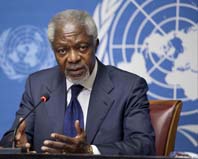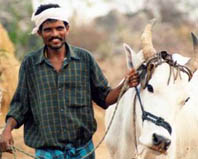
|
Often the mere presence of a UN force has been enough to avoid war. In response to the presence of Soviet nuclear missiles in Cuba, U.S. President Kennedy launched a naval blockade against Cuba and asked the Security Council to intervene. The UN and peacemaking diplomacy on both sides of the dispute succeeded in halting Soviet ICBM deployment in Cuba. The U.S. then called off the blockades and negotiations with Chairman Khrushchev continued to a peaceful resolution. U.S. diplomat Clark Eichelberger commented about the UN’s role during the crisis: “Let us picture the U.S. and the Soviet Union deadlocked in the Caribbean, without a Security Council where they could appear and where the hopes of all mankind could be expressed. It is hard to see how one or the other could have pulled back from such a perilous position. Indeed, one could say that if there had been no UN the two giants might have confronted each other with disaster.” Since 1964, UN forces have maintained a shaky cease-fire between a Greek majority and a Turkish minority on Cyprus. The opposing sides threatened violent takeovers both before and after UN intervention. UN peacekeepers are still there, a waste of UN and peacekeeping resources. Nothing has been achieved over almost thirty-eight years to settle this longstanding ethnic dispute. Greek Cypriot president Georgios Vassilou stated, “The duty of the world is not ended by setting up the peacekeeping forces. Peacekeeping is not peacemaking. The only reason for peacekeeping is to stop the killing and give time for peacemaking.” This dispute must be settled sooner or later, so why not now? If peoples of different histories, such as Belgium or Switzerland, can be peaceful, why not Cyprus? The winding down of the Cold War in the mid 1980s gave the UN many more opportunities to make and keep peace. A major activity has been to send peacekeeping missions to act as a deterrent to armed hostilities. There have been over fifty peacekeeping missions since the one to monitor the armistice between Israel and the Arab States in 1948. The number of missions has increased in frequency and scope as armed conflicts within states has increased. (See Appendix H for detailed information on current UN peacekeeping missions.) Recent peacekeeping missions are much more demanding than the routine patrolling of cease-fire boundaries. Duties have included disarming warring factions, as in El Salvador, and functioning essentially as a temporary substitute government in the absence of stable law and order, as in East Timor. Some peacemaking missions have not succeeded in achieving their goals. UN-backed economic sanctions failed to stop Iraq’s invasion of Kuwait, and the Gulf War sanctioned by the UN followed in 1991. A UN-sponsored peace accord in Angola was short-lived. UN peacekeepers were not able to disarm both sides in a long civil war before an election was held, and fighting resumed soon after the election. In Cambodia the UN had over 20,000 soldiers, police, and civilians, as part of a $4 billion operation over two years to stabilize the economy and the government, and to prevent continuing warfare between the Khmer Rouge guerrillas and the government forces. For many years the UN has had to literally “govern” Cambodia as a protectorate. Peacekeeping is rarely easy. Some UN members resent UN “meddling,” while others want early intervention to solve political disputes. Some of the problems hampering peacekeeping are selfinflicted. Peacekeepers are often not equipped for, nor allowed to take, military action, except in self-defense. In 1993, for example, heavily armed Serbian gunmen killed a Bosnian official travelling in a “protected” UN convoy. In Rwanda UN peacekeepers were incensed by being under orders not to fight off guerrillas killing civilians in a “UN protected safe haven.” When Somalia collapsed after prolonged clan warfare the UN was too late to prevent fighting and looting of UN food and medical supplies, and finally was forced to ask in late 1992 for U.S. troops to intervene. They got some supplies delivered, and stemmed the violence to some degree, but in May 1993, U.S. troops were replaced with a UN force which was under-armed, outnumbered, and unable to prevent further bloodshed, because the troops were able to fire only in self-defense. A Transitional National Government was formed, sat in the UN, and was backed by the Organization of African Unity and the Arab League. But the government enrolled guerrilla gunmen, and most of Mogadishu, the capital, remained in chaos. A peace agreement was signed in December 2001. Fighting was resumed by a number of tribes and small secessionist regions. The UN High Commission for Refugees commented, “If UN forces are going to fight their way into a place, humanitarian organizations delivering aid are going to have a very hard time carrying out their mission because their credibility as impartial organizations would be undermined.” Recently, in Afghanistan, a U.S. shipment of food and medical aid was set on fire by an anti-U.S. mob. The Universal Declaration of Human Rights was one of the first objects of UN study in 1946 and was formally adopted in 1948. The Declaration encourages respect for “the highest aspirations of the common people . . . faith in human rights, in the dignity and worth of every person, in the equal rights of men and women and of nations large and small.” It mandates “human rights and fundamental freedoms for all, without distinction as to race, sex, language or religion.” Specifically, the declaration affirms the right to equal protection against discrimination, arbitrary arrest or exile, slavery, cruel or inhuman punishment; equal opportunity under the law, a fair trial; the right to privacy, freedom of residence and movement within a home country, political asylum, freedom to marry without restriction of race, nationality, or religion, and the freedom to own property. Subsequent articles affirm the universal right to freedom of thought, conscience, religion, opinion, speech, assembly, and participation in one’s own government. Currently the main focus of the UN protection of human rights is on topics of genocide, slavery and forced labor, the persecution of refugees, racial discrimination, discrimination against women, hostage taking, and torture. There is also concern for the rights of ethnic minorities, native or indigenous peoples and migrant workers, concern about economic globalization, the HIV/AIDS pandemic which exceeded twenty-five per cent of the population in many subSaharan countries, child trafficking, and terrorism. Military action erupted in Macedonia in 2001 when frustrated ethnic Albanians fought for repatriation. In El Salvador, killings of judges, kidnapping, and police brutality continued. Prison abuses were reported in Brazil, Chile, Morocco, Malawi, Mozambique, and Turkey. In Malaysia harsh measures were taken to limit the rights of assembly and free speech. |
|||
 |
|||
|
“The epidemic of world lawlessness is spreading. When an epidemic of physical disease starts to spread, the community approves and joins in a quarantine of the patients in order to protect the health of the community against the spread of the disease.”
President F. D. Roosevelt Speech—Chicago, 1937
|
|||
 |
|||